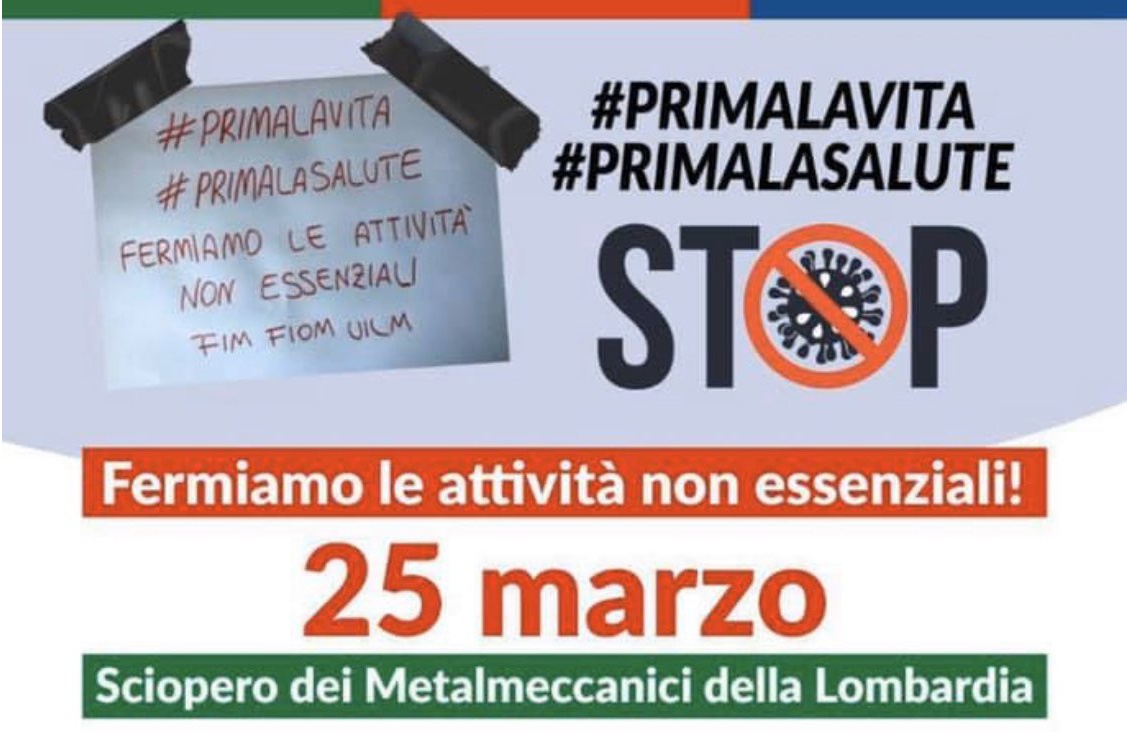26 March, 2020UPDATE : During negotiations with the Government on CGIL, CISL, and UIL secured a revision to the definition of ‘essential productive activities’ allowed to operate during the health crisis with a new decree dated 25 March. This new decree replaces the one from 22 March and establishes a new reduced list of authorized production activities. The trade unions are satisfied with the new decree as it reduces the number of people having to go to work and therefore better protects workers’ safety and health.
Numerous metalworkers participated in an eight-hour general strike called on 25 March by Italian unions FIOM, FIM and UILM in Lombardy, the heaviest COVID-19 affected region in northern Italy. Local unions report about work abstention levels as high as 60 to 90 per cent in all the provinces of the region.
The high rate is partially explained by already implemented measures of smart working, interruption and reduction of working hours and other procedures put in place through the unions’ demands.
It is also a demonstration of support to union requests both in Lombardy and at the national level, demanding a closure of all non-essential production activities.
The unions decided on to the strike to persuade the government, which under pressure from the employers’ association Confindustria had approved a wide list of the companies allowed to continue production despite the pandemic.
According to FIOM, FIM and UILM companies currently have room for interpretation in what is considered an essential service, so many continue their activities.
In light of the current spread of the corona virus, the unions have declared:
“We believe that the list is too enlarged, also including sectors of dubious importance and necessity."
One example where work continued is a factory producing engines for hair dryers and vacuum cleaners.
Commenting on the results of the strike in a joint statement Fiom, Fim and Uilm said:
“The mobilization of the metalworkers was in support of the initiative of the national confederations [CGIL, CISL and UIL] vis-à-vis the government which has made itself available to review the list of essential activities that can therefore continue their operation. In these hours the exchange between CGIL, CISL, UIL and the government has resumed and we hope will lead to the expected and requested results also through this strike. Stopping production activities for about ten days means reducing the possibility of contact between people and thus contain the chances of contagion, and this beneficial both for people’s health and our healthcare system which must be preserved from the risk of collapse.”
The unions will "ensure that all those who have to return to work will operate safely and with full respect for their health. We will not hesitate, as shown, to block activities that do not comply with health requirements and safety measures."
In a solidarity message, IndustriALL general secretary Valter Sanches, said:
"IndustriALL Global Union calls on the government of Italy to protect the health and safety of all the workers who continue to work because they are providing essential services or working in vital manufacturing industries during this pandemic. Furthermore, IndustriALL, in line with the statement from the council of global unions from 12 March, is calling for safe factories or simply shutting down workplaces.”
